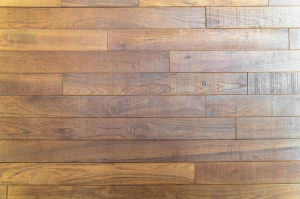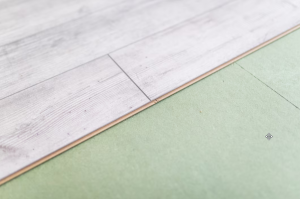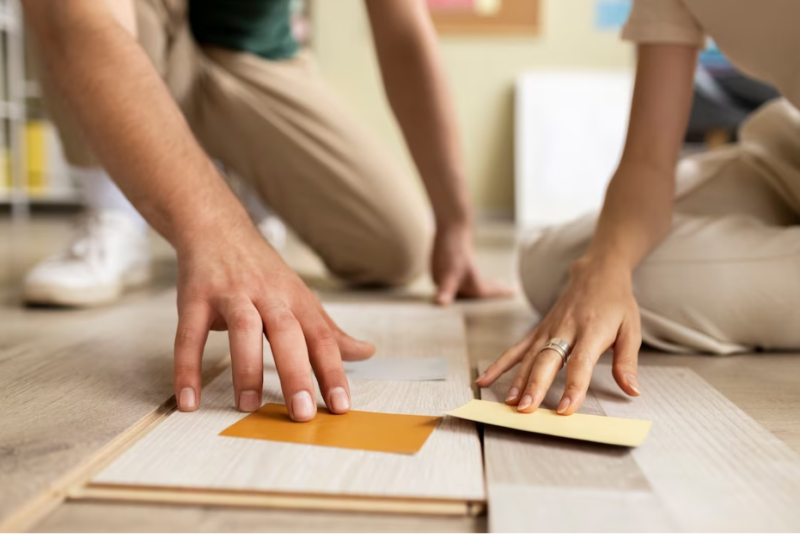Commercial property owners must regularly renovate their buildings to promote safety and attract high-quality tenants. To this effect, flooring renovations are one of the most commonly executed in commercial properties, as commercial floors will be put to the test much more stringently than those in residential properties.
There is a wide range of flooring materials from which to choose, each offering unique benefits for specific applications. For example, a good flooring material for an apartment unit probably will not be the best choice for an industrial warehouse. With this in mind, keep reading for a detailed comparison of some of the most common flooring options used in commercial renovations.
Hardwood

Hardwood floors are a timeless and elegant choice for commercial properties. They are incredibly durable and can last for decades with proper maintenance. Not only do they look great, but hardwood floors can also increase the value of a property and attract tenants who value style.
However, it is important to remember that hardwood floors do require some maintenance to ensure they remain in good condition. This includes sealing and staining the floors to protect them from dirt and wear. The best polyurethane for floors is one that is durable and long lasting, as this will help to ensure the longevity of the floors.
Vinyl

Vinyl flooring also has many benefits for a commercial property. It is water-resistant, easy to work with, and comes in a wide variety of colors and styles. Vinyl flooring is also more economical than other flooring types, such as hardwood or epoxy terrazzo.
One of the biggest benefits of vinyl flooring is its water resistance. This makes it an ideal choice for areas that are prone to moisture, such as bathrooms. Vinyl flooring is also easy to clean and maintain, which can save time and money for businesses.
Vinyl flooring is also a more economical option than other flooring types. It is less expensive to purchase and install, and it can last for many years with proper care. This makes vinyl flooring a wise investment for businesses that are looking for a low maintenance and affordable flooring option.
However, there are some drawbacks to vinyl flooring. It is not the best choice for high-traffic areas, as it can show wear and tear over time. If the building will see a lot of machine traffic or frequent moving and sliding of furniture or shelving, it may be better to look at more heavy-duty flooring. Additionally, vinyl flooring is not a particularly elegant or highly desirable material, so it will not increase the resale value of a commercial property.
Laminate

Laminate flooring is a type of flooring that is made up of multiple layers. The top layer is a wear layer that is made of a durable material, such as melamine or aluminum oxide. The middle layer is a core layer that is made of a composite material, such as fiberboard or particleboard. The bottom layer is a backing layer that is made of a material that is resistant to moisture, such as polyethylene.
Laminate flooring is a good choice for commercial properties because it is affordable and comes in a wide variety of finishes. Laminate flooring is also resistant to moisture and scratches, which makes it a strong choice to withstand normal wear. Additionally, laminate flooring is easy to clean and maintain, which can save time and money for businesses.
There are some drawbacks to using laminate flooring in commercial properties. Laminate flooring can be noisy, and it can be difficult to repair if it is damaged. Additionally, laminate flooring is not as durable as some other types of flooring, such as ceramic tile or polished concrete.
Tile
Tile flooring is a type of flooring that is made of a material such as ceramic, porcelain, or stone. It is a durable and long-lasting material that can withstand a lot of wear and tear. Tile flooring is also easy to clean and maintain, making it a great choice for commercial properties.
There are many benefits to using tile flooring in commercial properties. First, tile is very durable. It can withstand heavy foot traffic and is resistant to scratches and dents. This makes it a good choice for areas that see a lot of activity, such as lobbies and retail stores. Tile is also relatively easy to clean. It can be swept, mopped, or vacuumed, and it does not require any special cleaning products. This makes it a low-maintenance option for busy commercial properties. Finally, tile is fire-resistant. It will not burn or support combustion, which makes it a safe choice for commercial properties.
Like other flooring options, there are a few drawbacks to consider when using tile flooring in commercial properties. Tile can be cold and hard underfoot. This can be a problem in areas where employees are standing for long periods of time. It can be slippery when wet. This can be a safety hazard in areas like kitchens and bathrooms, so it is important to look for non-slip coating to apply to tile surfaces. Lastly, tile can be expensive to install, often requiring the skills, tools, and expertise of specialists in tile and grout.
Epoxy Terrazzo
Epoxy terrazzo is a type of flooring that is made by mixing epoxy resin with aggregate, such as marble chips or granite. The mixture is then poured onto a subfloor and allowed to cure. Epoxy terrazzo is a durable and long-lasting flooring option that is ideal for many types of commercial properties.
There are numerous benefits to choosing epoxy terrazzo for commercial flooring. Epoxy terrazzo is arguably the most durable flooring material on the market. It is resistant to scratches, cracks, and stains. This makes it perfect for high-traffic areas, such as lobbies and warehouse floors. It is also a low-maintenance flooring option. It can be easily cleaned with a mop and a mild detergent. Finally, epoxy terrazzo scores high for versatility. It can be customized to create a variety of looks, from a classic terrazzo look to a more modern look.
Despite its many benefits, it will usually take a major upfront investment to install epoxy terrazzo floors, as it is among the most expensive flooring types. In addition, epoxy terrazzo can be slippery when wet. This can be a safety hazard in areas where there is a lot of foot traffic, so be sure to promptly clean any spills on an epoxy terrazzo surface to limit liability. Epoxy terrazzo can also be difficult to repair. If a section of epoxy terrazzo is damaged, there aren’t a lot of solutions other than re-pouring the damaged section.
Polished Concrete
Polished concrete flooring is an excellent choice for commercial properties, as it is extremely durable and easy to maintain. It can also be polished into a variety of attractive finishes, such as smooth, matte, and glossy.
The durability of polished concrete is one of its main advantages. It is highly resistant to wear and tear, and can last for many years with minimal maintenance. In addition, it is resistant to moisture, making it an ideal choice for areas that may be exposed to water or humidity.
Polished concrete is also easy to maintain, as it is resistant to dirt and grime. It can be cleaned with a simple mop and water, and does not require any special cleaning products. This can help the building owner save time and money in the long run.
Another benefit of polished concrete is its versatility. It can be polished into a variety of attractive finishes, such as smooth, matte, and glossy. This allows for a wide range of design options, and the ability to create a unique and customized look for any commercial property.
In terms of drawbacks, the most important point to consider is that polished concrete can be a loud flooring type. This is because the polished concrete reflects sound, which can cause distracting echo within a space. If you are wondering how to reduce echoing in a room with polished concrete floors, it is important to use the right areas rugs and underlayment. This will help to absorb some of the sound and make the room quieter.
Choose the Right Flooring Material For Your Next Renovation
Regular renovation is critical for commercial building owners to keep their properties safe and attractive. With this in mind, commercial floors are one of the areas that need to be renovated most frequently, as they see elevated wear and tear over residential floors. For more ideas on how to plan a flooring project for your commercial property, check out the resources on SVN Dunn Commercial for the latest in the industry!

